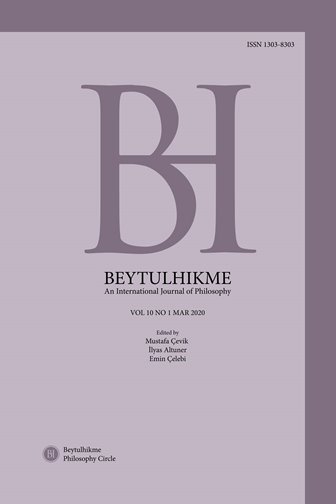Author :
Abstract
Frankfurt Okulu üyeleri içinde politik duruşu ile öne çıkan Herbert Marcuse, Okulun düşüşe geçtiği dönemde oldukça popüler hale gelmiştir. 1960’lara kadar kapitalist toplumlarda değişim fikrine oldukça mesafeli duran Marcuse, başeseri Tek-Boyutlu İnsan’da bu mesafeyi, tek boyutlu toplum fikri ile getirir. Modern toplumların eleştirisi noktasında okul ile aynı çizgide ilerleyen Marcuse, 1960’lardan itibaren yükselişe geçen öğrenci hareketlerinin etkisiyle kendi teorisini de gözden geçirmiştir ve toplumsal değişim imkânını, işçi sınıfında değil öğrenciler ve diğer emekçi sınıflarda görmüştür. Marcuse’nin düşüncesindeki bu dönüşüm, onun 1968’de meslektaşı Hans Meyerhoff’a ithaf ettiği ve Beyond One-Dimensional Man adını verdiği konferansta dile getirdiği düşünceleri üzerinden okunabilir. Dahası, bu görüşleri, Marcuse’nin sonraları kaleme alacağı geç dönem çalışmalarındaki temaları aydınlatması bakımından önemlidir. Marcuse’nin diğer çalışmalarının gölgesinde kalan bu metin, bu çalışmada Marcuse’nin eleştirel teorisindeki dönüm noktalarından biri olarak ele alınmaktadır.
Keywords
Abstract
Herbert Marcuse, who stands out with his political stance among the members of Frankfurt School, has become quite popular at the time of the school’s decline. Marcuse remained very distant to the idea of change in capitalist societies until the 1960s, he brought this distance with the idea of a one-dimensional society in his masterpiece of One-Dimensional Man. Having proceeded in line with the school about the critique of modern societies, Marcuse revised his theory under the influence od the student movements that had been on the rise since 1960s, and saw the possibility of social change in students and working classes, not in the proletariat. One can trace this transformation in Marcuse’s thought in the lecture, which he dedicated to his colleague Hans Meyerhoff in 1968 and called Beyond One-Dimensional Man. Moreover, these views are important in terms of elucidating the themes in the later works of Marcuse. Having been overshadowed by Marcuse’s other Works, this lecture is considered in this paper one of the touchstones in Marcuse’s critical theory.
Keywords
- Adorno, T. W. (2011). Kültür Endüstrisi Kültür Yönetimi. (Çev. N. Ülner & M. Tüzel & E. Gen). İstanbul: İletişim Yayınları.
- Bottomore, T. (1997). Frankfurt Okulu. (Çev. A. Çiğdem). Ankara: Vadi Yayınları.
- Busch, G. (1970). Ünlü Düşünür Herbert Marcuse'le Devrim Hakkında Bir Gö- rüşme. (Çev. T. Karamustafaoğlu). Ankara Üniversitesi Hukuk Fakültesi Dergisi, 27 (1), 31-36.
- Goldmann, L. (2013). Marcuse’yi Anlamak. (Çev. H. E. Bağce). Frankfurt Okulu. (Ed. H. E. Bağce). Ankara: Doğu Batı Yayınları, 309-323.
- Holz, H. H. (2012). Frankurt Okulu Eleştirisi. (Çev. O. Geridönmez & M. Çallı & Z. E. Kaya). İstanbul: Evrensel Basım Yayın.
- Jay, M. (2014). Diyalektik İmgelem. (Çev. S. Doğan). İstanbul: Ayrıntı Yayınları.
- Kellner, D. (2014). Marcuse ve Radikal Öznellik Arayışı. (Çev. M. Polat). Felsefelo- gos, 53, 87-103.
- Kellner, D. (2002). Introduction to the Second Edition. One-Dimensional Man. (Ed. D. Kellner). London & New York: Routledge, xi-xxxviii.
- Kızılçelik, S. (2008). Frankfurt Okulu. Ankara: Anı Yayınları.
- Küçük, A. (2010). Frankfurt Okulu ve Eleştirileri: Günümüzde Yeni Siyasal Yaklaşım- lar. (Ed. H. O. İnce). Ankara: Doğubatı Yayınları, 138-172.
- Marcuse, H. (2003). Özgürlük Üzerine Bir Deneme. (Çev. S. Soysal). İstanbul: Ayrıntı Yayınları.
- Marcuse, H. (2001). Beyond One Dimensional Man. Towards A Critical Theory of Society. (Ed. D. Kellner). London: Routledge, 107-120.
- Marcuse, H. (1997). Tek Boyutlu İnsan. (Çev. A. Yardımlı). İstanbul: İdea Yayınla- rı.
- Marcuse, H. (1991). Karşıdevrim ve Başkaldırı. (Çev. G. Koca & V. Ersoy). İstanbul: Ara Yayıncılık.
- Marcuse, H. (2007). Özgürlükler Alanı ve Zorunluluklar Alanı. (Çev. D. B. Kılınç). Felsefe Yazın, 10, 40-43.
- Slater, P. (1998). Frankfurt Okulu: Kökeni ve Önemi. (Çev. A. Özden). İstanbul: Kabalcı Yayınevi.
- Therborn, G. (2013). Frankfurt Okulu. (Çev. H. E. Bağce). Frankfurt Okulu. (Ed. H. E. Bağce). Ankara: Doğu Batı Yayınları, 19-54.
- Zahn, L. (2004). Herbert Marcuse: Egemen Akılcılığa İtiraz. (Çev. A. Kanat). 20.Yüzyıl Filozofları. (Ed. M. Fleischer). İzmir: İlya Yayınevi, 367-389. Öz: Frankfurt Okulu üyeleri içinde politik duruşu ile öne çıkan Herbert Marcuse, Okulun düşüşe geçtiği dönemde oldukça popüler hale gelmiştir. 1960’lara kadar kapitalist toplumlarda değişim fikrine oldukça mesafeli duran Marcuse, başeseri Tek-Boyutlu İnsan’da bu mesafeyi, tek boyutlu toplum fikri ile getirir. Modern toplumların eleştirisi noktasında okul ile aynı çizgide ilerleyen Marcuse, 1960’lardan itibaren yükselişe geçen öğrenci hareketlerinin etkisiyle kendi teorisini de gözden geçirmiştir ve toplumsal değişim imkânını, işçi sınıfında değil öğrenciler ve diğer emekçi sınıflarda görmüştür. Marcuse’nin düşüncesindeki bu dönüşüm, onun 1968’de meslektaşı Hans Meyerhoff’a ithaf ettiği ve Beyond One-Dimensional Man adını verdiği konferansta dile getirdiği düşünceleri üzerinden okunabilir. Dahası, bu görüşleri, Marcuse’nin sonraları kaleme alacağı geç dönem çalışmalarındaki temaları aydınlatması bakımından önemlidir. Marcuse’nin diğer çalışmalarının gölgesinde kalan bu metin, bu çalışmada Marcuse’nin eleştirel teorisindeki dönüm noktalarından biri olarak ele alınmaktadır. Anahtar Kelimeler: Frankfurt Okulu, eleştirel teori, Herbert Marcuse, tekboyutlu insan, Hans Meyerhoff.





